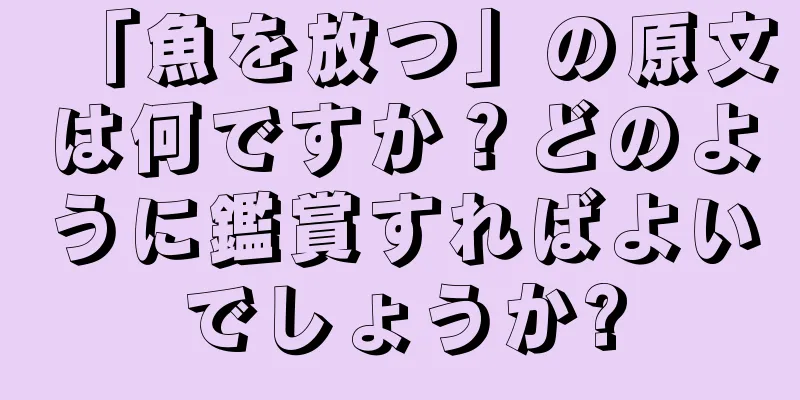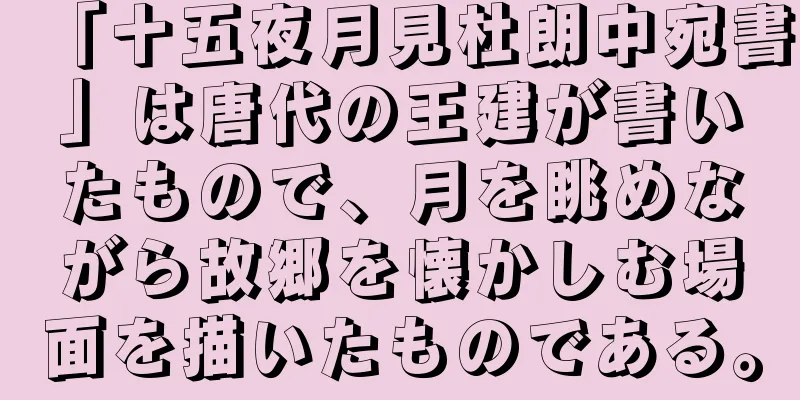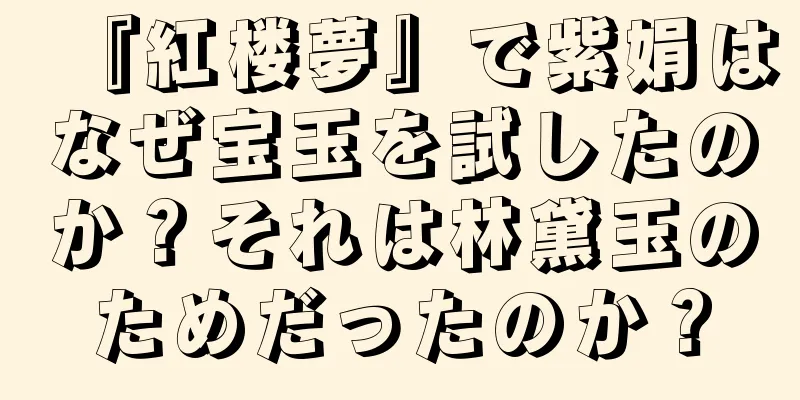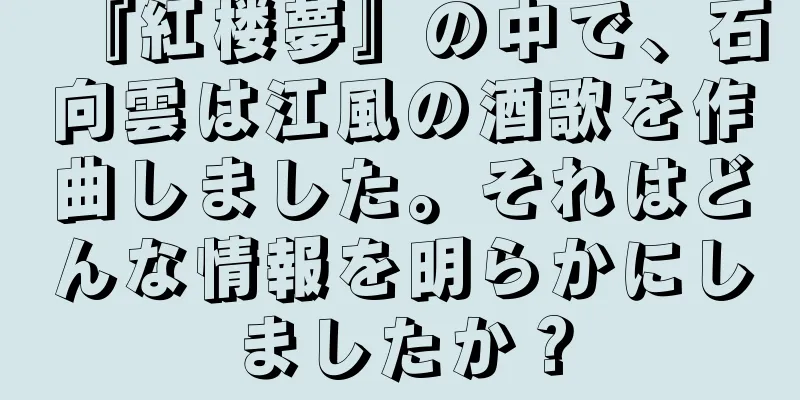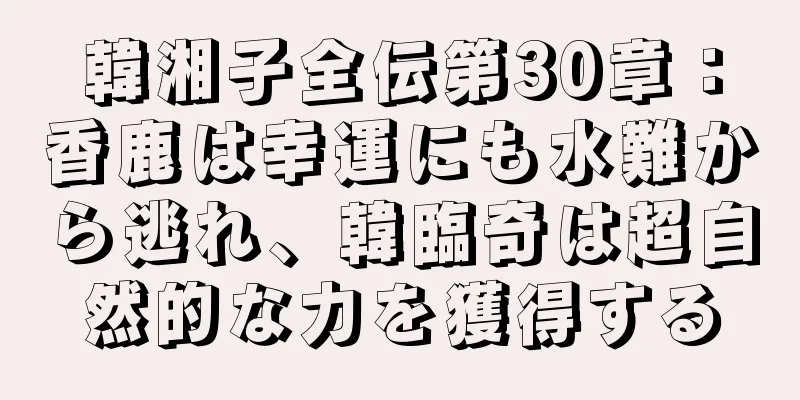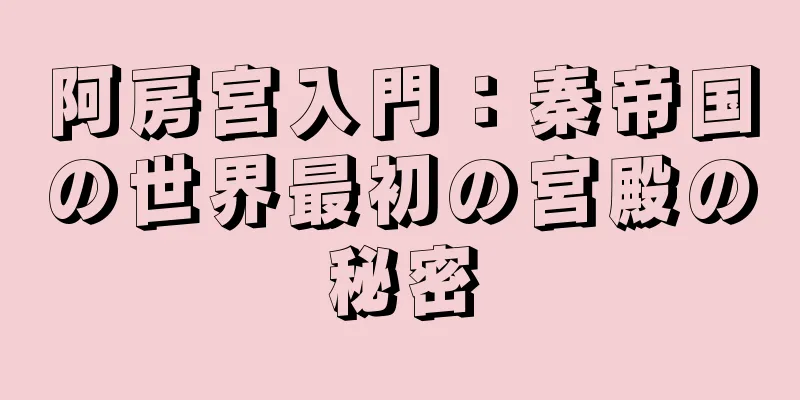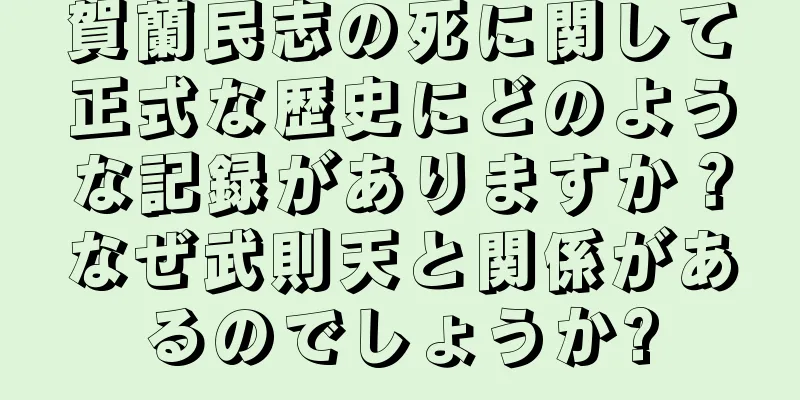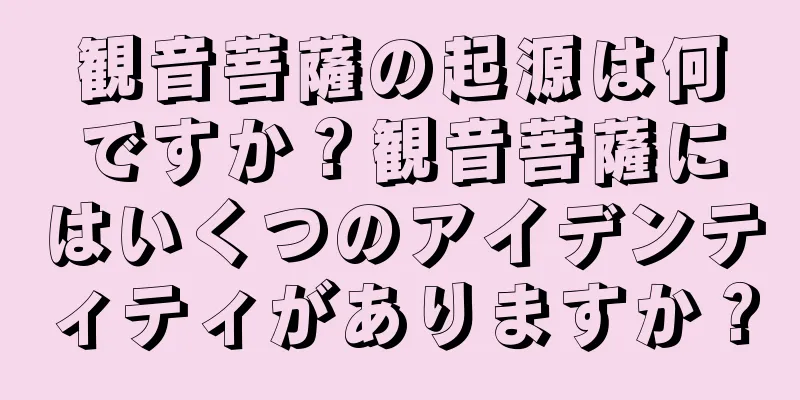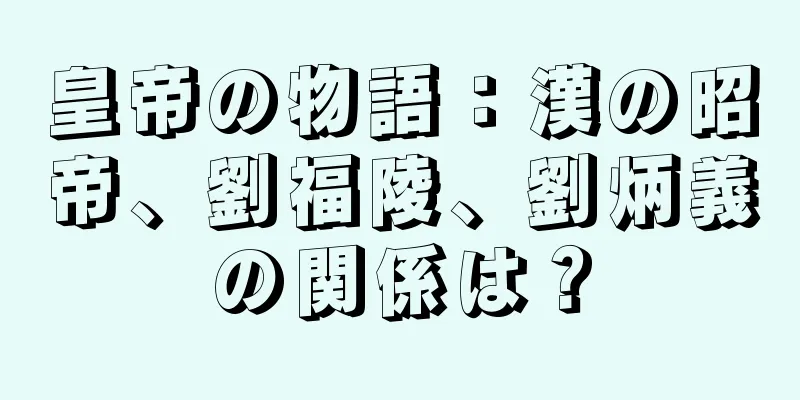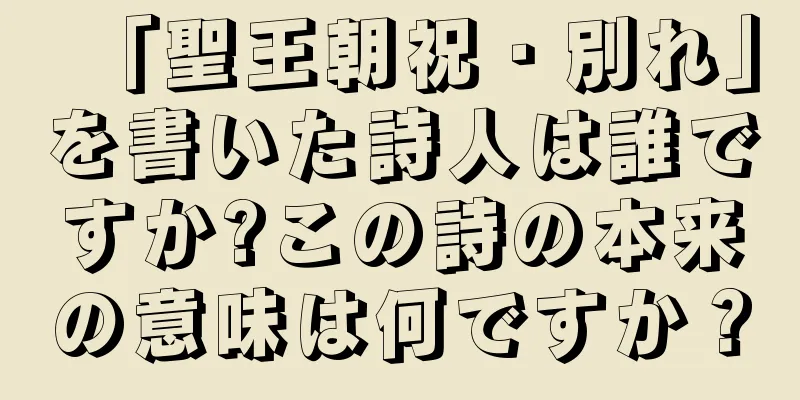秦以前の学術書『管子善志書』とはどういう意味ですか?
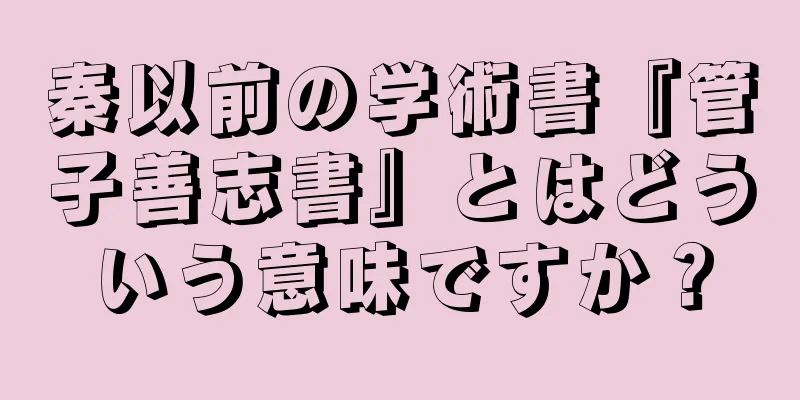
|
秦以前の学術書『管子』に書かれた思想は、当時の政治家が国を治め、世界を平定するために用いた偉大な原則と方法でした。では、「管子善智書」の原理とは何でしょうか?次の興味深い歴史編集者が詳しく紹介しますので、読み続けてください〜 Duke Huan asked Guanzi, "Liang Ju said to me, 'In ancient times, taxes were light and taxes were heavy. No one would obey this.' What do you think of Liang Ju's words?" Guanzi replied, "What Liang Ju said is not true. When taxes were light, the granaries were empty; when taxes were heavy, the tools and utensils were not in good condition. When tools and utensils were not in good condition, the princes could not wear furs and coins; when the granaries were empty, the people were poor and had no salary. Externally, furs and coins were not worn by the whole world; internally, the country was poor. What Liang Ju said is not true. The king has mountains, and the mountains have gold. You can use them to establish currency. You use currency to measure grain and grant salary. Therefore, the grain in the country is at the top, and the price of grain is ten times higher. Farmers sleep at night and get up early, and do not wait to see the king. The five grains are ten times higher. Scholars die for the king with half salary. Farmers sleep at night and get up early, and work hard without stopping. Those who are good at governing a country do not say to make people work, but to make them have to work; they do not say to make people poor, but to make them have to work. Therefore, the people have no reason to be forced to work. What Liang Ju said is not true." Duke Huan said, "Good." グアンは再びグアンツィが尋ねました「あなたが言ったことは間違っています。給料が太っていれば、学者は死なないでしょう。通貨が軽い場合、学者は簡単に報酬を与えません。学者は怠zyであり、3人の怠zyな人がいますか?学者は私たちがナンセンスと呼んでいるものです。 桓公は管子に尋ねた。「昔、周の民が天下を治めていました。君主は従順で、教えは天下に広まりましたが、下層民からは奪われました。その数はいくらですか?」管子は答えた。「王は土地を分けて貢物を納め、市場と朝廷は一体となって流れていました。金は一本の棒、江陽の真珠は一本の棒、秦の明山の青石は一本の棒です。これを少を多と見なし、狭を広と見なし、それが道の範疇です。」桓公は言った。「天下の数は、すべて道の範疇ですか?」「今、国の穀物は10倍重く、他のものはすべて軽くなっています。官吏は賈志に『穀物を運んで財を集めなさい』と言いました。穀物の重さは1つですが、今は9つがそれより多くなっています。穀物は重く、すべてのものは軽いです。これならば、国の富の9つは官吏の手にあります。国の年が逆になり、富と品物の9つがすべて倍になって送り出されます。富と品物は下にあり、通貨の9つは官吏の手にあります。したがって、通貨と穀物は官吏の手にあります。皇帝は客として旅し、適切な時期に派遣するように命じます。穀物を収穫する人々は去り、王子は彼らを受け入れて官吏にします。彼らは集まって友人に与え、人々の需要を満たすためにすべてのものを上げ下げします。内部では、官吏は勝手に戻って忠誠を尽くさず、外部では、王子が集まって友人に与え、穀物を収穫する人々は去り、皇帝は権力を失います。」桓公は言った。「よかった。」 Duke Huan asked Guanzi again, "Is it right to have the whole world for life and not lose it?" Guanzi replied, "Please do not apply it to the whole world, but only to our country." Duke Huan said, "What do you mean by that?" Guanzi replied, "The size of a country, the fertility of the soil, and the surplus of food at the end of the year are all fixed. Those who guard the country only guard the grain. If you say, 'The land of a certain county is so large, and the land of another county is so small, then you must accumulate coins, and then the counties, states, and villages will receive public money. In the autumn of the year, the grain of the country will be one-third less. The king will issue an order that the counties, the officials, and the villages will all record the amount of millet they collect. The weight of the grain is one-third, and it is stored in the government. If the grain of the country is one-third, then two-thirds will be stored in the government. In the spring of the year, the grain of the country will be doubled, which is the number. In the summer of the year, the grain is taxed in the market, and the people all receive the grain from the government to cultivate the land. In the autumn of the year, the fields will say, 'The amount of grain left to me is so-and-so, but now the government is collecting grain in coins.' The people said, 'There is no currency for grain.' Then the people will... 3つのことは、王が王に戻ってきて、王に戻ってきて、王が王に戻ってきたので、王に戻ることができます。 、王子の穀物は私の国に戻り、私の国の穀物は王子に戻ります。そして、これは王子からの一部を隠すことであり、偉大な役人は豊かで贅沢になることはできません。 「 桓公は管子に尋ねた。「国会の会議について教えてください。」管子は答えた。「高官を失えば部下も失うことになります。ですから、郡の政策で高官を守り、郷の政策で郡を守り、一家の政策で郷を守り、一人の政策で家族を守るべきです。」桓公は尋ねた。「会議の回数はいくつですか?」管子は答えた。「通貨の数に応じて、郡は郡内の田に対する政策を持たなければなりません。郷は郷内の田に対する政策を持たなければなりません。家族は家族内の人々に対する政策を持たなければなりません。したがって、ある時に郡を守らないのはあなたと共にいることではなく、ある時に郷を守らないのはあなたと共にいることではない。」桓公は言った。 「どうしてそんなことができますか?」と管子は答えた。「王は財産を民の中に隠し、覇者は財産を官吏の中に隠し、亡国は財産を箱の中に隠すのです。」桓公は言った。「民の中に隠すとはどういうことですか?」「分配してください。湛台の金は成陽に分配し、魯台の布は済陰に分配してください。王は民に命令を下してこう言うべきです。『民が富めば王は貧しくなるな。民が貧しければ王は富むな。だから税には金も布も入れず、政府に金を蓄えてはならない。富は民の中に蓄えておくべきだ。』豊作の年には穀物が豊富で穀物が安い。穀物の値段を前年より下げて、その金で支払うべきだ。穀物は王であり、金は下である。国の通貨はすべて下である。貨幣は軽く、穀物は重い。初年の二銭は底にあり、二年の二銭は上にあるので、二年の四銭は上にあり、国の穀物の一銭は底にあり、穀物は三倍重い。国の布帳は年間十銭である。一家に十ムープラス十、十世帯の家族に食糧が与えられる。それは国の穀物計画からであり、貨幣に隠されている。国の通貨は再び人々に分配するために使用され、国の穀物は4つ減り、3つは上にあり、1つは下にいます。計画を回復するためです。大臣は土地を集めて封土し、穀物を蓄えて傲慢になります。会議でそれを奪ってください。」桓公は言った。「会議で奪うとはどういう意味ですか?」管子は答えた。 He said, "One-third of the grain is at the top, which means that the people should receive the best grain, and the king should store it there. The five grains are in the same order and the weight is reduced by one-third. The rest is the national currency and the grain is used as the standard. The officials should not be more than one-tenth. The king uses currency to pay salaries, and one-tenth is at the top. The king gives out grain, and seven-tenth is removed. The king collects three and taxes seven, and distributes them to those who have no resources. This is benevolence and righteousness. The five grains are in the same order and are light, which is the number; the whole village is heavy and the country is registered, which is the number; the real wealth is distributed, benevolence and righteousness are distributed, and all things are light, which is the number. Take advantage of the time to advance and retreat. Therefore, it is said that the king takes advantage of the time, and the sage takes advantage of the ease." Duke Huan said, "Good." 桓公は管子に尋ねた。「彼は私に『皇帝には三百人の知事がおり、とても寛大である。官吏はこれに従うように』と命じました。どう思いますか?」管子は言った。「それは法的な家ではありません。官吏は棟を高くし、部屋を美しくします。これでは農民は農業や市場の仕事を奪われます。これは国を利益する方法ではありません。民は絹を織って地面に残しておくことはできません。国を治めるのに優れた人は、状況を利用してゆっくりと素早く行うだけです。これを国会といいます。」 Duke Huan asked Guanzi, "May I ask how to deal with disputes?" Guanzi said, "It starts with relatives." Duke Huan asked, "What do you mean by using relatives to start?" Guanzi replied, "The ruler of a country has ten brothers, and the country is divided into ten parts; if there are five brothers, the country is divided into five parts. After three generations, the ancestors are the same, and after ten generations, they are the same ancestors. Therefore, corpses are buried everywhere, and the war is endless. The families of light and heavy are wandering in between. Therefore, it is said: Do not give people land, and do not give people wealth. When wealth ends, it begins, and it rises and falls with the four seasons. The sage manages it with slowness and speed, guards it with decisiveness and blocking, seizes it with lightness and heaviness, and practices it with benevolence and righteousness, so it is the same number as the earth and the sky. This is the great bridle of the king." 桓公は管子に「馬貨について教えてください」と尋ねた。管子は答えた。「初めは三大官の家に6里ごとに馬が1頭あり、26人ごとに馬が1頭ずつありました。馬貨は、6里ごとに田畑の質、穀物の量、穀物の価値が決められていました。6里ごとに貨幣が使われ、6里ごとに穀物の重さが決められていました。そのため、馬貨は全国に配られ、貨幣は国の土地の数に等しくなりました。これを馬貨と呼びました。」桓公は「馬貨の数はどうやって使われますか」と尋ねた。管子は答えた。「学者は貨幣で資本を受け取り、官僚は貨幣で郷を受け取り、人と馬は貨幣で食料を受け取りました。したがって、国の穀物資源は上にあり、貨幣は下にあります。次に、国の穀物は10倍の量であり、これが数です。すべてのお金と財産は10分の2に減らされ、これが政策です。革、腱、角、羽、竹の矢、道具、および君主が国の道具として使用するのに適した財産はすべて、正方形の証明書を付ける必要があります。君主はそれらを郷と州に保管し、「特定の月の特定の日に命令に従う場合、郷と州が決定します」と言います。したがって、「同じ日に決定する」と言われています。国の政策は穀物トラックから来ており、国の政策品は馬に乗るために使用される通貨です。現在、ナイフと布は官庁に保管されており、細かい通貨とすべてのものの重量は商人の手にあります。彼らの通貨は重く、すべてのものは軽く、通貨は軽く、すべてのものは重く、穀物は重いです。君主が穀物、通貨、金のスケールを制御すれば、世界は安定できます。これは世界を保護する数です。」 グアンは、「スケール、体重、および国会について聞いたことがあります「人々の問題を書く風下の門に書記があります。タングを養う人々と人々を養う人々の世話をしない場合、彼は首都のランクから連れ去られ、郡の存在の間に彼の家族と一緒にいると言われていますフェングイとロングクシアの羊の犠牲は、これがエチケットと道徳の10倍です。 桓公は管子に「国勢について教えてください」と尋ねた。管子は答えた。「山岳地帯の国、水の豊かな国、山地が分断された国、水浸しの国、土が浸食された国。これらは君主が心配すべき5つの国勢です。山岳地帯の国は常に穀物の3分の1を貯蔵し、水の豊かな国は常に国の穀物の3分の1を支配し、山地が分断された国は常に国の穀物の10分の1を支配し、泉が損なわれた国は常に国の穀物の20分の1を支配し、土が浸食された国は他の属国に穀物を慎重に提供し、陶器に銘を刻む職人に穀物を提供します。これらは時代に応じた5つの国勢です。」 桓公は管子に尋ねた。「今、私は国全体と諸侯を掌握しているが、国の力は用いてはならないのか?」管子は答えた。「今、私は諸侯を諸侯の飾りとして用い、四季に乗って莫老の策略を遂行させ、東西南北を比べ、均衡のとれた基準で用いている。したがって、もし諸侯を待ち受けていれば、諸侯に応じてあらゆるものを上下させることができる。もし諸侯が天下を握っていれば、朝から晩まであらゆるものを守るために金を集め、調整するだけでよい。利益が十分であれば前進し、不十分であれば停止することができる。王は諸国を巡り、時々観察し、利益が傾かないようにし、死をその場所に記録する。王は大と一を守る。これを国の帳という。」 |
<<: 秦以前の学術書『管子・上国記』は何を表現しているのでしょうか?
>>: 秦以前の学問書『管子奎度』は何を表現しているのでしょうか?
推薦する
法正と郭嘉はともに三国時代の軍師でした。二人のうちどちらがより強かったでしょうか?
郭嘉は曹操より21歳年下でしたが、曹操の壮大な野望をよく知っていたようです。曹操が郭嘉に天下の情勢に...
『紅楼夢』の金陵十二美女の中に妙玉が含まれていた理由は何ですか?
『紅楼夢』に登場する金陵十二美人の一人、妙玉は蘇州出身で、髪を切らずに仏教を実践する在家の仏教徒であ...
『紅楼夢』の王希峰の離婚の真相とは?誰が責任者ですか?
王希峰は金陵十二美女の一人であり、賈廉の妻である。今日は、Interesting Historyの編...
なぜ劉備は関羽に徐州を守らせなかったのか?むしろ、張飛のような無謀な人物が警備していたのか?
三国志演義を読むと、劉備の前半生の失敗をいつも残念に思います。当初、劉備は関羽と張飛という二人の強力...
劉裕の北伐の分析:劉裕の指揮下にあった将軍は誰ですか?
東晋の実際の統治者である劉裕は、歴史上後世の多くの人々から賞賛されてきました。彼の 2 度の有名な北...
「草を踏む:月の光は水のよう」の原文は何ですか?これをどう理解すべきでしょうか?
草の上を歩く:水のような月明かり那蘭興徳(清朝)月の光は水のようで、波紋は絹のようで、かすかな煙と枯...
『Tiaoshan Cang』の作者は誰ですか?どのように鑑賞すればよいでしょうか?
蒼山韓愈(唐代)山は緑で、川の水は黄色です。波は打ち寄せ、高い丘の上には松や糸杉が生い茂ります。翻訳...
宋代のワイン醸造技術はどうだったのでしょうか?非常に高度な技術
宋代のワイン製造技術がどのようなものであったか知りたいですか?宋代のワイン製造技術は、以前の王朝に比...
温廷雲の『雲済寺に泊まる』:著者は生涯を通じて禅僧との交流を楽しんだ。
文廷雲は、本名は斉、雅号は飛清で、太原斉県(現在の山西省)の出身である。唐代の詩人、作詞家。彼の詩は...
『呂氏春秋』の冀東に関する真実とは?
『呂氏春秋・冀東記』に記された冀東の真相とは? どのように理解すればよいのか? これは多くの読者が詳...
『紅楼夢』の少女、香玲はなぜ宝玉の前でスカートを着替えたのでしょうか?
翔玲の悲劇的な人生は、彼女が両親のもとを去った後に始まった。興味のある読者とInteresting ...
『呂留四公遣朝』を鑑賞するには?著者は誰ですか?
六師を朝廷に派遣する杜甫(唐代)私たちは40年間、子供の頃から親しかったのですが、その間に連絡が途絶...
『The Scholars』の第 12 章のあらすじは何ですか?どのように評価しますか?
第12章:名学者が迎座湖で宴会を開き、騎士たちが偽の首脳会談を開く楊志忠は二人の君子に言った。「三さ...
杜神艶の「蘇万書記に贈る」:詩人の優れた叙情表現力を示す
杜神艶(645年頃 - 708年頃)は、雅号を畢堅といい、襄州襄陽(現在の湖北省襄陽市)の出身で、晋...
史公の事件第263章:郝奇渾は棒で打たれて捕らえられ、李其厚は勇敢に戦って敵を殺した
『世公安』は清代に人気を博した民間探偵小説です。初期の版は『石判事物語』『石判事事件奇談』『百奇事件...
